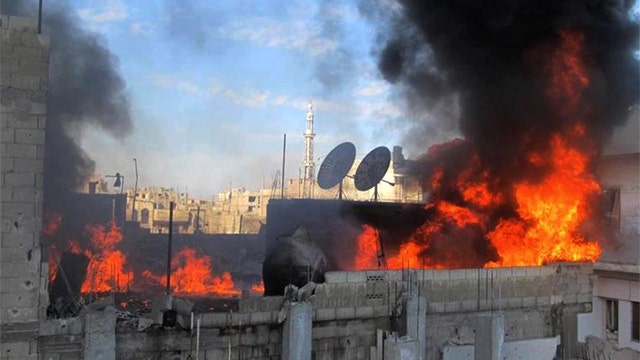What is the US strategy in Syria?
J.D. Gordon asks if limited US naval strikes will stop Assad from using chemical weapons in the future
President Obama's national security team prepared to make its case to Congress on Tuesday for a military strike on Syria, as the president continued to woo powerful lawmakers to help in his effort to win congressional support for an attack.
The Senate Foreign Relations Committee will conduct the first hearing on the proposed Syria strike on Tuesday afternoon. Secretary of State John Kerry, Defense Secretary Chuck Hagel and Gen. Martin Dempsey, chairman of the Joint Chiefs of Staff, are scheduled to testify.
On Tuesday morning, the president and Vice President Biden hosted leaders of key congressional committees in the Cabinet Room of the White House. At the top of the meeting, Obama stressed that the Assad government "needs to be held accountable" for the use of chemical weapons, and that the U.S. action would not be open-ended.
"This is not Iraq, and this is not Afghanistan. This is a limited proportional step," Obama said.
Ahead of the hearing, Obama also met Monday with Sen. John McCain, R-Ariz., who has been an ally in recent debates over immigration and other issues, and Lindsey Graham, R-S.C.
The president faces an uphill climb in winning the congressional support he now says he will court. McCain, though, voiced cautious optimism as he spoke in favor of a strike against the regime of Syrian President Bashar al-Assad, whom the administration says ordered an Aug. 21 sarin gas attack that killed more than 1,400 of his own people.
McCain emerged from the roughly one-hour meeting saying that Congress voting against a strike would “undermine the credibility of the president of the United States and America. … But we have a long way to go.”
He also echoed the Capitol Hill message that has emerged since Obama said Saturday that he would strike Syria -- making sure the effort is clearly intended to oust Assad and helping the rebels.
“What we want to do is degrade Assad’s capabilities and upgrade that of the rebel forces,” McCain said.
At least three U.S. ships are already in the eastern Mediterranean Sea, from where the U.S. is expected to launch a missile strike.
The Pentagon said Monday that the Nimitz group, which includes four destroyers, will remain in the southern Red Sea and called the decision “a prudent movement of forces should the capabilities of the strike group be needed."
McCain was joined at the White House by Graham, a fellow Republican and member of the Senate Armed Services Committee.
Graham emerged from the meeting with similar remarks, adding that he is seeing signs that the White House is moving toward a more clearly defined mission.
“I can’t sell an attack like the ones on Iraq and Afghanistan because I don’t want to,” he also said.
The White House said National Security Adviser Susan Rice also attended the meeting.
The Obama administration has lobbied Congress almost relentlessly this holiday weekend, calling leaders from both parties and leading classified briefings on Capitol Hill, in addition to the White House invitation to McCain and Graham. And members of the president’s national security team will continue those efforts in the coming days.
On Wednesday, Kerry will testify again on Syria at an open hearing of the House Foreign Affairs Committee. And Kerry along with Director of National Intelligence James Clapper will testify at a closed, classified hearing of the Senate Foreign Relations Committee.
Obama surprised many by his decision to seek congressional authorization. The decision likely put off any military action at least until the week of Sept. 9, when Congress is set to return from recess.
One senior U.S. military official intimately familiar with the planning said the delay costs the Pentagon money, with U.S. Navy assets burning through fuel awaiting orders.
However, the official said it also hurts Assad. Though the conventional wisdom is that Assad has time to hide his military assets, the official said that moving those assets allows the Pentagon to see them. “If you move it, we see it,” the senior U.S. Defense official told Fox News.
Obama, in his efforts to win America’s support for a strike, also faces the similar-yet-larger challenge of gaining international support, with Russia and China on Monday leading the international opposition.
Russia's foreign minister, Sergey Lavrov, said the information the U.S. showed Moscow trying to prove that the Syrian regime was behind the recent chemical-weapons attack is "absolutely unconvincing."
Moscow is Assad's key ally, weapons supplier and protector at the United Nations.
Meanwhile, China said it opposes the U.S. acting alone and that any response must conform to the United Nations Charter and the basic principles underlying international relations.
"China is highly concerned about the relevant country's plan on taking unilateral military action," said Hong Lei, a spokesman for the country’s Foreign Ministry.
And the Assad regime, which has denied ordering the gas attack, has reportedly asked the United Nations to prevent “any aggression” in response to the allegation.
Right now, France is the only country to support United States' efforts, after the British Parliament last week rejected Prime Minister David Cameron’s proposal to endorse military action against Syria.
The Assad family has ruled in Syria for four decades, and more than 100,000 people have been killed in the roughly 2-year-long civil war to overthrow the Assad regime.
Eighty-three members of Congress attended a classified briefing Sunday on Capitol Hill with administration officials. The full House and Senate return from summer recess on Sept. 9, but party leaders are considering whether to call members back early.
The weekend lobbying also included Kerry appearing on all five major Sunday shows, as Capitol Hill lawmakers said Obama may not have the votes right now.
“I would say if the vote were today, it would probably be a no vote,” New York Rep. Peter King, a member of the House Permanent Select Committee on Intelligence, told “Fox News Sunday.”
The comment underscored the risk Obama took in deciding over the weekend to seek approval from Congress, a step King argues he didn't need to take.
Democrats also expressed reservations.
"I certainly enter this debate as a skeptic, but I'm going to allow the administration to make its case this week," Sen. Christopher Murphy, D-Conn., a member of the Senate Foreign Relations Committee, told NBC on Sunday.
Kerry told “Fox News Sunday” that he couldn’t imagine Congress would “turn its back” on Israel or other U.S. allies in the region and on the Syrians slaughtered in the chemical weapons attack outside Damascus.
Fox News’ Jennifer Griffin and The Associated Press contributed to this report.












































